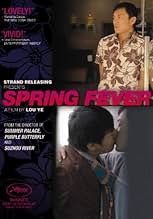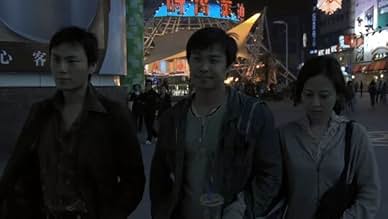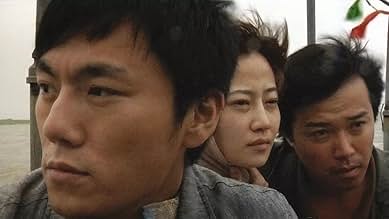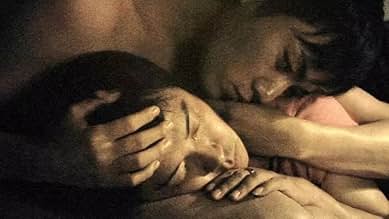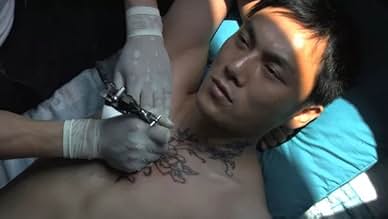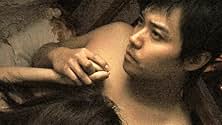Chun feng chen zui de ye wan
- 2009
- 1h 56min
CALIFICACIÓN DE IMDb
6.4/10
1.8 k
TU CALIFICACIÓN
Agrega una trama en tu idiomaHired to spy on a philandering husband, Luo Haitao soon becomes entangled in a clandestine affair with the other man. Along with Luo's girlfriend, they succumb to the delirium of drunken nig... Leer todoHired to spy on a philandering husband, Luo Haitao soon becomes entangled in a clandestine affair with the other man. Along with Luo's girlfriend, they succumb to the delirium of drunken nights, but how long can their tryst last?Hired to spy on a philandering husband, Luo Haitao soon becomes entangled in a clandestine affair with the other man. Along with Luo's girlfriend, they succumb to the delirium of drunken nights, but how long can their tryst last?
- Premios
- 5 premios ganados y 6 nominaciones en total
- Dirección
- Guionista
- Todo el elenco y el equipo
- Producción, taquilla y más en IMDbPro
Argumento
¿Sabías que…?
- Bandas sonorasBastard
By Angry Jerks
Guitar/Vox by Gao Feng
Upright Bass/Vox by Feng Xiaona
Background Vox by Zhou Ge
Opinión destacada
LGBTQ subject has been woefully underrepresented in mainland Chinese cinemascape, which excludes the more liberal soils of Hong Kong and Taiwan, notable bids including Zhang Yuan's novelty-seeking BEHIND THE FORBIDDEN CITY (1996), Hong Kong director Stanley Kwan's tearjerker LAN YU (2001), and this one, a Cannes' BEST SCRIPT winner from Chinese Sixth Generation auteur Lou Ye.
SPRING FEVER, its Chinese title is borrowed from a novel from Yu Dafu (1896-1945), a Chinese modern novelist and poet, which literally means: a night deeply drunk on the spring breeze. Its texts are also woven into the narrative, in ultra bold typography, and most significantly, in the finishing shot, evoking a potent sense of nostalgia against a somber palette.
Setting in a contemporary Nanjing, the story starts with a tryst between Jiang Cheng (Qin Hao, taking a terrific turn as the backbone of the film, downplaying the stereotype and proudly wearing his heart on his sleeves without much help of lines), a young travel agent and Wang Ping (Wu Wei), a married bookshop proprietor. Wang's suspecting wife Lin Xue (Jiang Jiaqi) hires Luo Haitao (Chen Sicheng, a far cry from a dewy-eyed 27-year-older) to shadow his husband and when their affair is debunked, Jiang ends the relationship but Wang clearly cannot get over him. A bi-curious Luo begins to hobnob with Jiang, follows him in a club where the latter gives a drag performance and is ready to get his feet wet in an unbeaten path, meanwhile, Luo's girlfriend Li Jing (Tan Zhuo, a lookalike of Lou's muse Hao Lei), who works in a fabric factory, is given special attention from her Cantonese-sporting boss (Zhang Songwen), but his business is not exactly law-abiding. Then midway through, the narrative gears down its dramatic thrust by adjusting its fulcrum onto an attempted ménage-à-trois shaping up during a lackadaisical sortie, imbuing a poetic atmosphere into an invisible cul-de-sac, all three parties are curtailed by their vacillations, which is brilliantly writ large in the karaoke segment, singing the same song THOSE FLOWERS, but there is something incompatible dangling in the air, presaging their ensuing rupture.
For my money, Lou's most extraordinary achievement is that he takes no prisoner in laying bare the self-defeating wishful thinking of having-your-cake-and-eat-it, a mindset so pandemic yet so difficult to resist. Most characters are riddled with this inimical ambiguity and cannot see an outlet, Wang Ping wants both his marriage and his boyfriend, Luo Haitao is both physically and emotionally gravitated to Jiang but also cannot let go of Li Jing, his last resort of being normal; and Li Jing, all the more, is stuck in the quagmire where she secretly expects her boss' commitment (which he never utters) but also harbors deep affection to Luo. In an odd way, it is Jiang Cheng, who has evolved into the most lucid-minded one here, he is able to cut the Gordon cord, not once but twice when he can see clear of the situations, thus, although one can niggle that tragedy again banally creeps into a gay story, but in the end of the day, Lou meritoriously inculcates us with his sage advice of making peace with oneself after inevitable detours through Jiang's baptism of fire (and blood).
Characterized by Lou's modus operandi, namely a lurking hand-held camera under the natural light, SPRING FEVER refuses to paper over its unappealing milieu (billows of steam and smog give an authentic look of the city itself, without its usual tourist-attracting designs), what on screen is perpetually dun and crummy, sometimes even blurry, yet leavened by Lou's even-handed calculation, ultimately, the film is intimately inviting and rewardingly pensive.
SPRING FEVER, its Chinese title is borrowed from a novel from Yu Dafu (1896-1945), a Chinese modern novelist and poet, which literally means: a night deeply drunk on the spring breeze. Its texts are also woven into the narrative, in ultra bold typography, and most significantly, in the finishing shot, evoking a potent sense of nostalgia against a somber palette.
Setting in a contemporary Nanjing, the story starts with a tryst between Jiang Cheng (Qin Hao, taking a terrific turn as the backbone of the film, downplaying the stereotype and proudly wearing his heart on his sleeves without much help of lines), a young travel agent and Wang Ping (Wu Wei), a married bookshop proprietor. Wang's suspecting wife Lin Xue (Jiang Jiaqi) hires Luo Haitao (Chen Sicheng, a far cry from a dewy-eyed 27-year-older) to shadow his husband and when their affair is debunked, Jiang ends the relationship but Wang clearly cannot get over him. A bi-curious Luo begins to hobnob with Jiang, follows him in a club where the latter gives a drag performance and is ready to get his feet wet in an unbeaten path, meanwhile, Luo's girlfriend Li Jing (Tan Zhuo, a lookalike of Lou's muse Hao Lei), who works in a fabric factory, is given special attention from her Cantonese-sporting boss (Zhang Songwen), but his business is not exactly law-abiding. Then midway through, the narrative gears down its dramatic thrust by adjusting its fulcrum onto an attempted ménage-à-trois shaping up during a lackadaisical sortie, imbuing a poetic atmosphere into an invisible cul-de-sac, all three parties are curtailed by their vacillations, which is brilliantly writ large in the karaoke segment, singing the same song THOSE FLOWERS, but there is something incompatible dangling in the air, presaging their ensuing rupture.
For my money, Lou's most extraordinary achievement is that he takes no prisoner in laying bare the self-defeating wishful thinking of having-your-cake-and-eat-it, a mindset so pandemic yet so difficult to resist. Most characters are riddled with this inimical ambiguity and cannot see an outlet, Wang Ping wants both his marriage and his boyfriend, Luo Haitao is both physically and emotionally gravitated to Jiang but also cannot let go of Li Jing, his last resort of being normal; and Li Jing, all the more, is stuck in the quagmire where she secretly expects her boss' commitment (which he never utters) but also harbors deep affection to Luo. In an odd way, it is Jiang Cheng, who has evolved into the most lucid-minded one here, he is able to cut the Gordon cord, not once but twice when he can see clear of the situations, thus, although one can niggle that tragedy again banally creeps into a gay story, but in the end of the day, Lou meritoriously inculcates us with his sage advice of making peace with oneself after inevitable detours through Jiang's baptism of fire (and blood).
Characterized by Lou's modus operandi, namely a lurking hand-held camera under the natural light, SPRING FEVER refuses to paper over its unappealing milieu (billows of steam and smog give an authentic look of the city itself, without its usual tourist-attracting designs), what on screen is perpetually dun and crummy, sometimes even blurry, yet leavened by Lou's even-handed calculation, ultimately, the film is intimately inviting and rewardingly pensive.
- lasttimeisaw
- 18 jun 2017
- Enlace permanente
Selecciones populares
Inicia sesión para calificar y agrega a la lista de videos para obtener recomendaciones personalizadas
- How long is Spring Fever?Con tecnología de Alexa
Detalles
- Fecha de lanzamiento
- Países de origen
- Sitios oficiales
- Idiomas
- También se conoce como
- Spring Fever
- Locaciones de filmación
- Productoras
- Ver más créditos de la compañía en IMDbPro
Taquilla
- Total en EE. UU. y Canadá
- USD 10,824
- Fin de semana de estreno en EE. UU. y Canadá
- USD 854
- 6 jun 2010
- Total a nivel mundial
- USD 161,110
- Tiempo de ejecución1 hora 56 minutos
- Color
- Mezcla de sonido
- Relación de aspecto
- 1.85 : 1
Contribuir a esta página
Sugiere una edición o agrega el contenido que falta

Principales brechas de datos
By what name was Chun feng chen zui de ye wan (2009) officially released in India in English?
Responda

